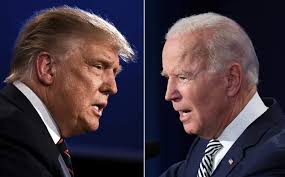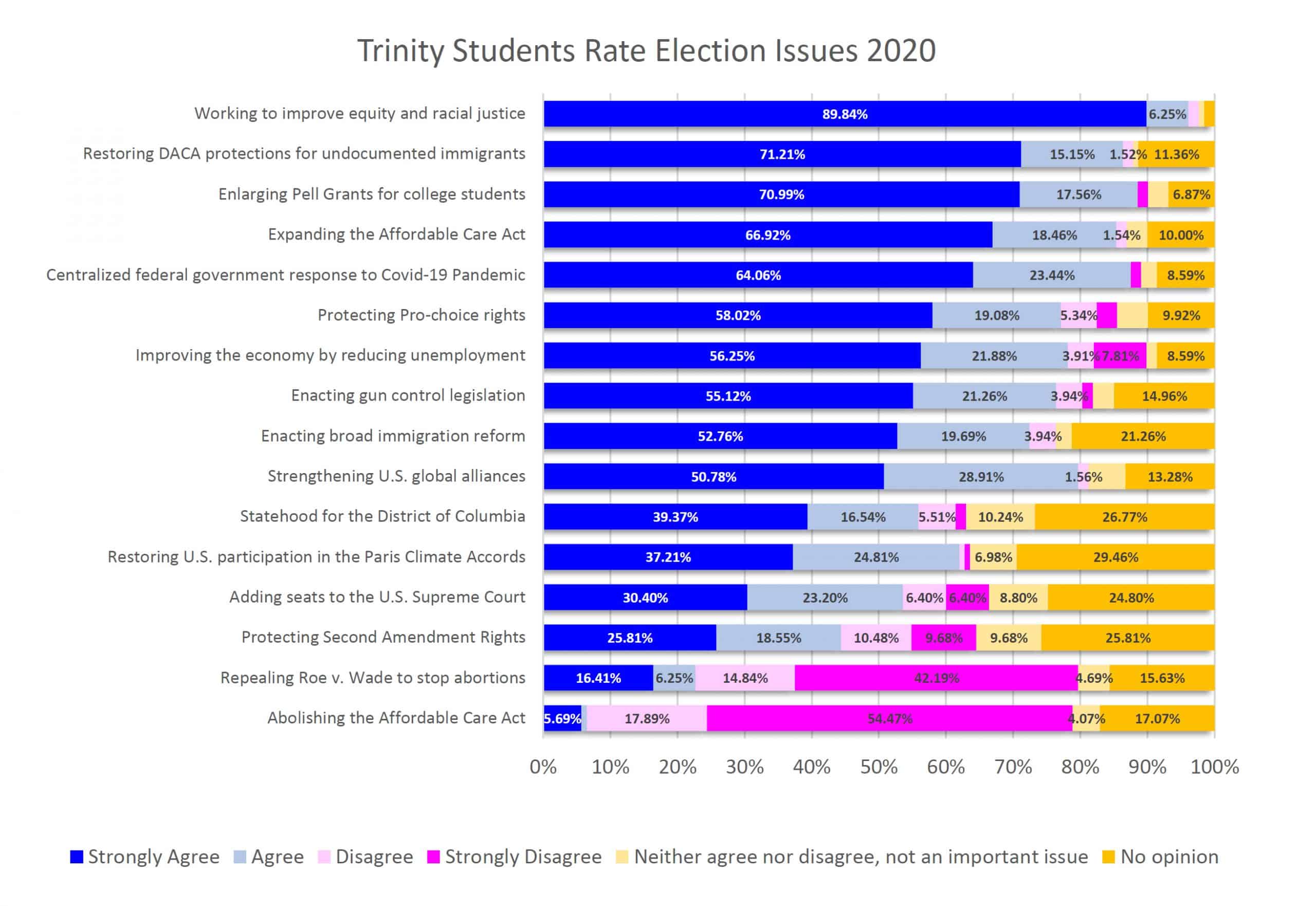
2020 Election: What’s At Stake For Trinity Students

Elections have consequences for every person, and voters cast their ballots based on what’s important to them, their families and communities. As I think about the 2020 presidential election, I want to know what is most important to our Trinity community, and most especially our students. What are the stakes in this election for Trinity students? Last week we conducted a survey that asked members of the campus community to rate a list of top issues, and the student responses are summarized above. Following is my reflection on the top issues at stake for our students, and an assessment of how the candidates would address the issues.
Improving Equity and Racial Justice
96% of students rate “strongly agree/agree” on improving equity and racial justice — the top issue for our students. This is a broad topic that includes a range of issues from police brutality as seen in the cases of George Floyd and Breonna Taylor among many others, to the ongoing effects of race discrimination in employment and housing, to chronic poverty that affects Black and Brown populations disproportionately, to inadequate public education and mass incarceration among many other issues.
While President Trump’s fanciful rhetoric congratulates himself on “being the least racist person in the room” and “doing more for Blacks than all American presidents in history except Abraham Lincoln” (yes, he said both of those things in the October 22 presidential debate, and has made those claims on numerous prior occasions), the fact is that this administration’s track record on racial justice is scandalously horrible. Remember, this is a person who repeatedly attacked the citizenship of the nation’s first Black president as Trump persisted in “birther” lies about President Barack Obama. Just a few among many examples of the Trump Administration’s efforts to roll-back the hard-won gains of the past century’s struggle for civil rights and equal opportunity:
- The Administration has issued an executive order prohibiting anti-racism and diversity training in federal agencies, calling such educational efforts a “malign ideology,” and the ban extends to all federal contractors which includes many colleges and universities;
- Additionally, in an announcement of his plan to promote “patriotic education” President Trump specifically attacked educational initiatives that expose the truth of American history, stating, “Critical race theory, the [Pulitzer-Prize-winning] 1619 Project and the crusade against American history is toxic propaganda, ideological poison, that, if not removed, will dissolve the civic bonds that tie us together, will destroy our country.”
- The Covid-19 pandemic has disproportionately impacted Black communities exposing brutal racial equities in healthcare and health conditions, and yet President Trump and his administration officials have failed to manage the pandemic in any effective way and failed to express concern or even acknowledge the disparate racial impact of the pandemic;
- President Trump has repeatedly refused to express empathy or concern for police brutality and the killings of Black persons at the hands of police; at the same time, he has championed “law and order” while deliberately attacked citizens exercising their right to protest against police brutality and racism, showing zero concern for the underlying causes of racial protests across the country; he has shown only the greatest contempt for the Black Lives Matter movement, calling it a “symbol of hate” rather than acknowledging the suffering and pain of racism that led to the creation of Black Lives Matter;
- At the same time, President Trump’s rhetoric and actions have encouraged white supremacists and violent vigilante organizations;
- In many tweets and numerous campaign appearances before largely white crowds of supporters, President Trump has repeatedly talked about an “invasion” of low income housing in suburbs that he claims he would prevent, rhetoric which is a thinly disguised racist call to segregation and elimination of fair housing policies;
- In the weeks leading up to the election, President Trump and his allies are engaging in egregious tactics of voter suppression that harm Black and Brown voters in particular.
Candidate Joe Biden has some serious flaws in his track record on racial justice as well, but these do not amount to the serious outright racism of the Trump actions and rhetoric, and Biden has also acknowledged mistakes and articulated a clear plan to improve.
- As a young member of the U.S. Senate, in 1972, Biden opposed busing as a means to enforce judicial orders to desegregate schools, a position that Senator Kamala Harris, now his running mate, criticized sharply during one of the primary season debates;
- In 1994, Biden was the architect of the Crime Bill that led to a substantial increase in the incarceration of Black men;
- Biden was also been criticized for being willing to forge compromises with segregationists in the Senate like the late Strom Thurmond in order to get legislation passed.
On the other hand, Biden was vice president serving with President Barack Obama, the first African American president in U.S. history, and Biden chose Senator Harris as the first African American woman on a national ticket. In contrast to President Trump’s lack of a serious platform to promote racial equity and justice, Candidate Biden has released an extensive plan to realize his commitment to racial justice, including such specific actions as funding greater educational opportunity especially in impoverished communities, reducing incarceration penalties for non-violent drug offenses (including legalization of marijuana), expanding federal efforts to reduce instances of police misconduct, improving healthcare and support for mental health and substance abuse conditions, and a range of related programs.
The Bottom Line:
Biden will do more to advance racial equity and justice.
Trump will continue to diminish efforts to improve racial equity and justice.
Restoring DACA Protections
86% of Trinity students agree that restoring DACA protections for undocumented immigrants must be a top priority. DACA — Deferred Action for Childhood Arrivals — was created in 2012 by President Obama to provide some legal protections (work permits, drivers licenses, e.g.) for young immigrants who arrived in the United States as children.
Donald Trump campaigned vigorously on the idea of restricting immigration, promising to “build the wall” and to eliminate DACA. He rescinded DACA in 2017, and despite numerous court rulings staying his order and a Supreme Court ruling overturning his recission, Trump and his administration have persisted in trying to dismantle DACA.
Trump’s campaign rhetoric in reference to immigrants is outrageous, repeatedly and shamefully mischaracterizing them as violent criminals and threats to American job security. He has cruelly and with malice separated families at the border, denied refugees the hopeful relief that the U.S. once offered, and denied the truth that immigrants have contributed mightily to American economic and social success. His administration now cannot find the parents of more than 500 young children who were forcibly separated from their parents. By just about any measure of decency and moral care for others, the Trump administration’s approach to immigration management is a horrific failure.
Candidate Joe Biden pledged to restore DACA as one of his earliest official acts if he is elected president, a position consistent with the actions of the Obama Administration in creating the program. Biden has also promised to end the family separation practices at the border, a terrible federal practice that should never exist. While some Trump advocates claim that the practice actually started during the Obama administration, the practice did not occur as a deliberate and massive effort to curb illegal immigration as it was used by the Trump Administration.
The Bottom Line:
Biden will restore DACA.
Trump will eliminate whatever remains of DACA that he has not already destroyed.
Enlarging Pell Grants for College Students
86% of Trinity students say that enlarging Pell grants must be a top priority.
The Trump Administration has virtually no coherent plan for higher education policy. To the extent that President Trump or Secretary of Education even think about colleges and universities, their positions seem ideological rather than arising from a true understanding of the role of higher education as an engine of economic prosperity. So, the administration launched a probe of Princeton after that venerable university publicly admitted a history of systemic racism, something that just about every major university can or should admit as a step along the way to developing a true anti-racist environment. Of course, mentioning “anti-racist” could invite a federal investigation given the administration’s ban on programs that examine critical race theory and systemic racism. While Trump has also issued an executive order concerning free speech on college campuses, the intent was to protect conservative speech, not all speech, and certainly not speech examining the reality of racism in American society.
But the question is about enlarging Pell grants. Trump does not seem to have any real plan for federal financial aid, including Pell grants.
Candidate Joe Biden, whose spouse Dr. Jill Biden has continued to teach in community college, has an extensive plan for higher education including doubling Pell grants and providing significant new funding for Minority Serving Institutions like Trinity. Biden would also propose to Congress a plan for helping low income families to afford a great college education in public and community colleges, and also private MSIs that already serve large numbers of low income students. Trinity students would reap many benefits from the Biden plan.
The Bottom Line:
Trump has no plan to enlarge Pell grants.
Biden’s plan calls for enlarging Pell grants and reducing or eliminating tuition for low income students and families.
Expanding the Affordable Care Act
85% of Trinity students “strongly agree/agree” that expanding the Affordable Care Act is important to them. Healthcare is a huge issue in this election, particularly during the pandemic, and both candidates have fairly clear positions.

President Trump has made it a goal of his administration to abolish the Affordable Care Act, a signature achievement of President Obama enacted in 2010 with the strong participation of Trinity Alumnae Speaker of the House Nancy Pelosi ’62 and Secretary of Health and Human Services Kathleen Sebelius ’70.
(Photo left: Secretary Sebelius, President Obama, Speaker Pelosi at the signing of the Affordable Care Act)
Since taking office in 2017, Trump has reverted to using Congress and the courts to cutback and strip away many of the benefits in the original ACA. In November, the Supreme Court will hear new arguments about whether the ACA is constitutional, with the timing of that hearing being one of the factors that hastened the Republicans’ desire to confirm Amy Coney Barrett as the new Supreme Court justice to take the seat vacated by the death of Justice Ruth Bader Ginsburg. The controversy revolved around questions about whether Barrett, who is conservative and who made previous comments calling the ACA into question, might rule against the ACA whereas Ginsburg, a reliable liberal, would have voted to uphold the law.
Candidate Biden is committed to restoring the ACA to full strength and building upon its benefits to make sure that all Americans are able to get the healthcare they need.
The Bottom Line:
Trump says he has a new healthcare plan to replace the ACA but he has yet to reveal the plan.
Biden would seek to restore and enlarge the ACA.
Centralized Federal Response to the Covid-19 Pandemic
87% of Trinity students “strongly agree/agree” that there should be a centralized federal response to the Covid-19 pandemic. To date, no such response has occurred despite the fact that the United States government has within the scope of its agencies some of the world’s most knowledgeable and powerful healthcare experts — the Centers for Disease Control, the National Institutes of Health. The lack of a concerted and aggressive federal response has left the states to enact a patchwork of many different programs to manage the pandemic, most of which are failing. As I write, coronavirus cases have surged to their highest daily total, with 88,500 cases reported on October 30, 2020; more than 228,000 Americans are dead, and nearly 9 million infected.
President Trump has recently insisted that the United States is “turning the corner” on coronavirus, and even though he was also infected recently, he continues to mock basic health guidelines like wearing a mask and keeping social distance. He has sidelined experts who do not agree with him, notably Dr. Anthony Fauci of NIH who is the nation’s top infectious disease expert. He has politicized the CDC to the point that the once-globally revered agency has lost its credibility. At various times, the president has blamed the fact of conducting coronavirus tests for the rise in the number of tests, and he has also blamed Democratic governors and mayors for the incidence of disease in their states, mostly coastal states with high diversity demographics. He does not seem to have a similar explanation for the steep rise in cases in midwest states where Republicans control the statehouses.
Candidate Joe Biden has a plan to combat the Covid-19 pandemic that includes a larger coordinated federal response including a national mandate on wearing masks, more coordinated federal support for testing and the ultimate vaccine distribution, and greater federal assistance to states for their local mitigation programs.
The Bottom Line:
Trump continues to insist that he’s done a great job fighting coronavirus and it will go away soon.
Biden pledges to mobilize the resources and organizing power of the federal government to direct an aggressive national program to contain the spread of coronavirus and prepare to vaccinate the population.
The Bottom Line
College presidents generally do not endorse political candidates — we strive to encourage political engagement and action among all students, faculty and staff, and a healthy climate for teaching about the issues and respecting all opinions. I do believe that an open climate in which everyone feels free to express their viewpoint is what our work in higher education must be about.
However, there are times when the gravity of moral issues at stake requires a president to take a stand. This is not in any way intended to stifle or diminish the validity of any other point of view. Mine is one voice among many on campus, albeit a voice that goes along with the title “president” that carries some weight. I do note that the Trinity campus community has also expressed its opinion in several surveys this semester.
In the face of the grave moral issues our nation faces on the issues listed above, issues that affect Trinity students deeply — the prevalence of racial hatred encouraged by the current administration, the inhumane treatment of immigrants and stripping DACA students of their minimal protections, the failure to address the urgent need for greater financial aid for low income college students, the deliberate efforts to debilitate healthcare protections, the failure of this administration to address the coronavirus pandemic with anything resembling a competent and effective program — I feel a deep obligation to speak out.
I also see other issues not listed above, but issues that go to the very heart of our mission at Trinity: the imperative of our Honor System to speak and act with truthfulness and integrity in all matters; the essential importance of respecting and upholding knowledge and scientific evidence as the basis for official action; the fundamental principle of social justice to respect and advance the dignity of every human being, including women, including persons of color, including those who are impoverished and marginalized, including those who profess beliefs not our own, including those who celebrate life in other languages, cultures and traditions.
The moral foundation of our work at Trinity is a belief in the beauty and wonder of all of God’s creation, and the whole purpose of our work in education is to empower our students to be effective stewards of that creation for future generations. This belief was the motivating force for the Sisters of Notre Dame in founding Trinity; 120 years ago this week, the very first SNDs and students arrived on this campus, and we have been pursuing that mission and vision ever since.
For all of these reasons, in assessing the candidates and these issues, I believe as a matter of my personal opinion as one citizen (not to be construed as an official position of Trinity) that Joe Biden is the candidate most likely to be a force for effectively addressing the core issues of most importance to our students and to Trinity, and to lead a restoration of the idea of a moral center in the conduct of national affairs, in the administration of the federal government, in providing relief to all those in need and in lifting up our national ideals of equality, liberty and justice for all.